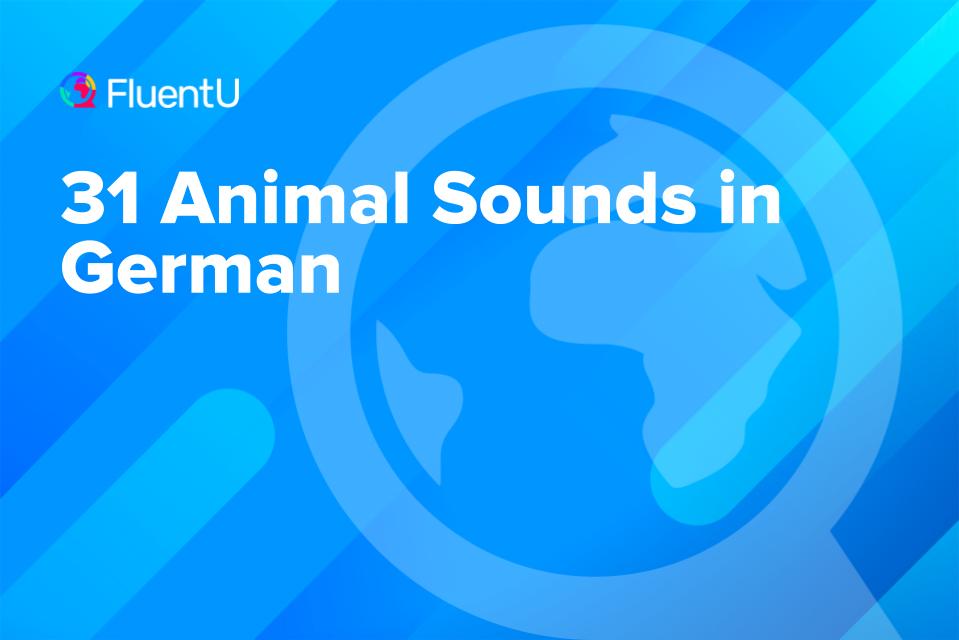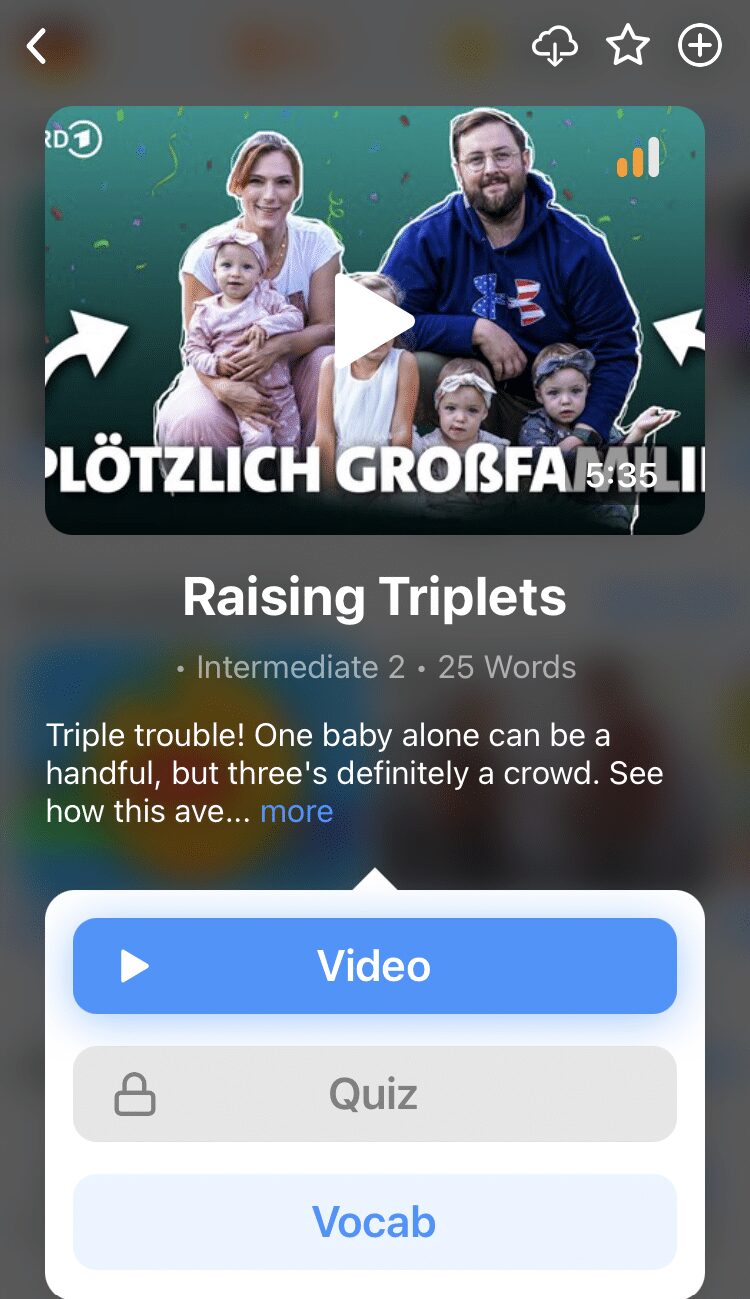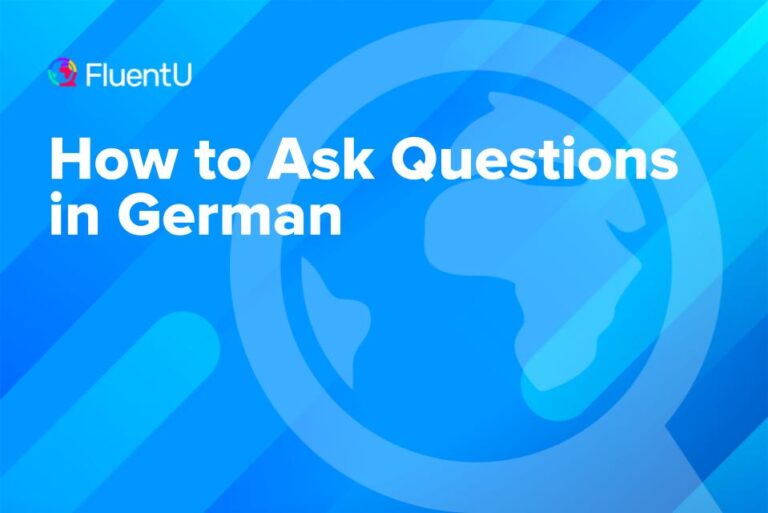Contents
- 1. Cow: muh (moo)
- 2. Cow: blöken (bleating)
- 3. Dog: wau wau (bow-wow)
- 4. Dog: wuf wuf (woof woof)
- 5. Dog: knurren (growl)
- 6. Dog: jaulen (howl)
- 7. Dog: bellen (bark)
- 8. Dog: kläffen (yap)
- 9. Cat: miau (meow)
- 10. Cat: schnurren (purr)
- 11. Bee: brummen or summen (buzzing)
- 12. Bird: tschilpen , zirpen or zwitschern (chirp)
- 13. Bird: gack gack (cluck cluck)
- 14. Bird: pfeifen (whistling)
- 15. Bird: gurren (coo)
- 16. Rooster: kikeriki (cock-a-doodle-doo)
- 17. Duck: quaken (quack)
- 18. Crow: krähen (crow)
- 19. Cuckoo bird: kuckuck (cuckoo)
- 20. Chicks: piep piep (peep peep)
- 21. Goose: schnattern (gaggle)
- 22. Owl: schreien or rufen (hoot)
- 23. Parrot: krächzen (squawk)
- 24. Frogs and toads: quaken (croak)
- 25. Horse: wiehern (neigh)
- 26. Horse: iaah (hee haw)
- 27. Pig: schnauben (snort)
- 28. Pig: quieksen (squeal)
- 29. Pig: grunzen (grunt)
- 30. Pig: grunz grunz (oink oink)
- 31. Big cat or bear: brüllen or brummen (roar)
- And One More Thing...
31 Animal Sounds in German

What does a German cow say, and why should you want to know? Well, for one thing, you’ll find that many German books, movies and TV shows use animal sounds. And if you’re learning German as a family, animal noises are a fun and easy way to entertain children.
I’ve organized these German animal sounds by the type of animal. So if you want to know the different sounds made by birds, we’ve covered all of them, as well as the verb forms and the name of each animal in German.
Download: This blog post is available as a convenient and portable PDF that you can take anywhere. Click here to get a copy. (Download)
1. Cow: muh (moo)
Classic cow mooing sounds exactly the same when spoken, but the spelling changes a bit. In German you would spell it as muh, and in English you spell it as “moo.”
It’s also worth mentioning that a German cow is called eine Kuh, and a group of cows is called eine Herde. If you need to use the moo sound in a sentence, as a verb, the word muhen is what you’re looking for.
2. Cow: blöken (bleating)
Bleating isn’t exactly a cow sound that people are used to practicing themselves, but it’s an essential part of a cow’s vocabulary. The word blöken represents a low bleating tone.
3. Dog: wau wau (bow-wow)
In order to give off the bow-wow sound of a dog, simply remove the English b’s and replace them with w’s. That turns it into wau wau.
The word dog is also helpful to know when matching up animal sounds, so you can say dog with the German word der Hund. As a bonus tip, a pack of dogs is called a Hundemeute.
4. Dog: wuf wuf (woof woof)
A woof has a similar sound in German and English, but the spelling changes to wuf wuf.
5. Dog: knurren (growl)
A growl noise isn’t reserved just for a dog, so you can use it for anything from wolves to bears and more.
Knurren is the proper sound to represent that fierce growl. The interesting part about this word is that it works for both the verb and the sound.
6. Dog: jaulen (howl)
Once again, a howl is also possible from other animals, but the sound comes out as jaulen in German. You’ll notice that this word works as a verb as well.
7. Dog: bellen (bark)
The bark sound is possibly the most common noise you hear from your lovable canine friend, and in German you would hear a dog use the sound bellen.
Although bellen works as a verb, it’s somewhat interchangeable with the bow-wow or woof woof noises above.
8. Dog: kläffen (yap)
If your dog’s in distress she may give out a yap, and a German pooch would use the kläffen sound. Once again, the kläffen sounds fits in a sentence as a verb.
9. Cat: miau (meow)
Meow sounds exactly the same in German as it does in English, but you spell it as miau. A cat, or eine Katze in German, can be found in a group of cats, which is considered a clowder in English but has no direct translation in German.
10. Cat: schnurren (purr)
Cats generally only make two sounds, so the second one is a purr. The purr sound is schnurren in German.
These are some of the most common German animal sounds because cats and dogs are very popular as pets! You can hear these animal sounds and get to know more casual words you wouldn’t find on a textbook on FluentU.
FluentU takes authentic videos—like music videos, movie trailers, news and inspiring talks—and turns them into personalized language learning lessons.
You can try FluentU for free for 2 weeks. Check out the website or download the iOS app or Android app.
P.S. Click here to take advantage of our current sale! (Expires at the end of this month.)
11. Bee: brummen or summen (buzzing)
What does a German bee sound like? A buzz is what you would call it in English, but the words brummen or summen work equally well for those black and yellow flyers in the heart of Germany.
To talk about a bee in German, you would say eine Biene, while a bee colony is called a Bienenvolk.
12. Bird: tschilpen , zirpen or zwitschern (chirp)
Birds are fun for learning, because they produce a wide range of unique sounds. To start, a chirp has three options in German: tschilpen, zirpen or zwitschern.
To say or write about a generic bird, use der Vogel. A flock of birds is called a Vogelschwarm.
13. Bird: gack gack (cluck cluck)
Various birds make the cluck cluck sound, but it may fall into the duck or goose families. This is an interesting one, because it looks and sounds nothing like the English version. Go with gack gack for the German cluck cluck.
14. Bird: pfeifen (whistling)
Do you hear that whistle? It’s a German bird speaking to its friends in the trees, yet your ears might deceive you because the sound itself is called pfeifen.
15. Bird: gurren (coo)
Coo is mainly reserved for doves, but quite a few birds have similar tones. If you spot a dove flying away from a wedding in Germany, you’d say that it’s making a gurren sound. To mention a dove in German, say eine Taube.
16. Rooster: kikeriki (cock-a-doodle-doo)
The rooster is a mainstay on farms in many countries, but how does that pesky bird wake people up in Germany? The Germans hear it as kikeriki. Ein Hahn is the way to talk about a rooster in German.
17. Duck: quaken (quack)
Ducks are birds too, and their famous quacks comes out as quaken in German. Many duck species exist, but your best bet is to use eine Ente when referring to our duck friends.
18. Crow: krähen (crow)
Crows, the blackened scavenger birds, have a signature sound that goes like this: krähen.
A crow is called eine Krähe when speaking in German. With one of the scarier group names, a collection of crows is called a murder, or Krähenschwarm for the Germans.
19. Cuckoo bird: kuckuck (cuckoo)
A cuckoo bird provides a fairly recognizable sound. The pronunciation adds a “k” to the end in German, pronounced kuckuck. Luckily for you, the actual cuckoo bird is spelled the same as the sound, except you capitalize the first letter: der Kuckuck.
20. Chicks: piep piep (peep peep)
A peep peep noise may be produced by baby birds, such as chicks or finches. The sound is the same, though the spelling turns to piep piep. Also, Jungvögel is the proper way to say baby birds.
21. Goose: schnattern (gaggle)
Geese make funny noises, and that doesn’t change in Germany. A gaggle sounds like schnattern. Say or write eine Gans when referring to an individual goose.
22. Owl: schreien or rufen (hoot)
When walking around at night you may have the privilege of hearing from those stereotypically wise owls. A hoot is either schreien or rufen.
Eine Eule is the best term when talking about an owl, and although most owls live solitary lives, a group is called a parliament. The direct translation for that in German is Parlament.
23. Parrot: krächzen (squawk)
Ein Papagei (a parrot) may let out a loud krächzen (squawk). Strangely enough, a group of parrots is considered a pandemonium, which comes to be Pandämonium in German.
24. Frogs and toads: quaken (croak)
When hearing a quaken (croak) in a lake, you can expect a frog or toad to be nearby. In German you can call them: ein Frosch (a frog) and eine Kröte (a toad).
25. Horse: wiehern (neigh)
Ein Pferd (a horse) lets out a beautiful wiehern (neigh).
26. Horse: iaah (hee haw)
You may also hear the goofy-sounding iaah (hee haw).
27. Pig: schnauben (snort)
Ein Schwein (a pig) provides another combination of sounds that makes it entertaining and useful while learning about German animal sounds. To start, the snort sound is schnauben.
28. Pig: quieksen (squeal)
Pigs squeal when they’re afraid, so to represent that you can use the quieksen sound.
29. Pig: grunzen (grunt)
Since pigs make so many noises, it’s worth mentioning that many of these sounds can be used for other animals as well—like this one. The grunt we often hear from pigs sounds like grunzen in German, which is useful as a verb as well.
30. Pig: grunz grunz (oink oink)
Make a quick modification of the grunt sound and you have the classic pig grunz grunz (oink oink).
31. Big cat or bear: brüllen or brummen (roar)
The roar, of course, is also not reserved for a single animal. While wandering around in the forest or in the mountains, however, you may have the chance to hear a lion, bear or tiger let one out.
In that case, the German sound for roar is either brüllen or brummen. A lion is called ein Löwe, a tiger is ein Tiger and a bear is ein Bär.
From a dog’s bark to a lion’s roar, we’ve touched on some of the most common German animal sounds for you to have fun with your kids, joke around with your friends and even talk to animals.
Just don’t start making these noises at work!
Download: This blog post is available as a convenient and portable PDF that you can take anywhere. Click here to get a copy. (Download)
And One More Thing...
Want to know the key to learning German effectively?
It's using the right content and tools, like FluentU has to offer! Browse hundreds of videos, take endless quizzes and master the German language faster than you've ever imagine!
Watching a fun video, but having trouble understanding it? FluentU brings native videos within reach with interactive subtitles.
You can tap on any word to look it up instantly. Every definition has examples that have been written to help you understand how the word is used. If you see an interesting word you don't know, you can add it to a vocabulary list.
And FluentU isn't just for watching videos. It's a complete platform for learning. It's designed to effectively teach you all the vocabulary from any video. Swipe left or right to see more examples of the word you're on.
The best part is that FluentU keeps track of the vocabulary that you're learning, and gives you extra practice with difficult words. It'll even remind you when it’s time to review what you’ve learned.
Start using the FluentU website on your computer or tablet or, better yet, download the FluentU app from the iTunes or Google Play store. Click here to take advantage of our current sale! (Expires at the end of this month.)












